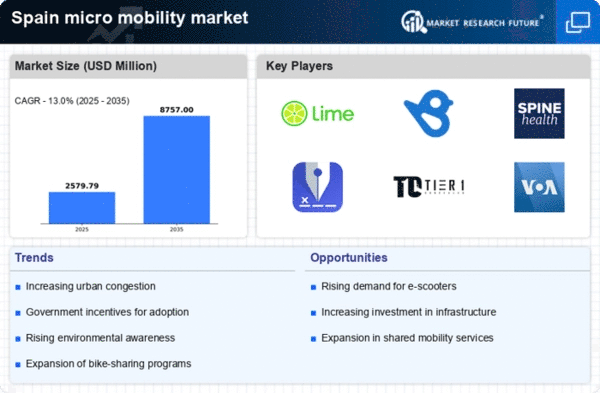Urban Congestion Mitigation
The micro mobility market in Spain is increasingly driven by the need to alleviate urban congestion. As cities like Madrid and Barcelona experience rising traffic levels, the demand for alternative transportation solutions grows. Micro mobility options, such as e-scooters and e-bikes, provide a practical means to navigate congested areas efficiently. According to recent studies, urban congestion costs the Spanish economy approximately €10 billion annually, highlighting the urgency for effective solutions. The micro mobility market appears well-positioned to address this challenge, offering a sustainable alternative that reduces reliance on traditional vehicles. Furthermore, the integration of micro mobility into public transport systems may enhance overall urban mobility, potentially leading to a more fluid transportation network. This trend suggests that as urban areas continue to expand, the micro mobility market will play a crucial role in shaping future transportation dynamics.
Changing Consumer Preferences
The micro mobility market in Spain is experiencing a shift in consumer preferences, with an increasing number of individuals opting for flexible and convenient transportation solutions. Urban dwellers, particularly younger generations, are gravitating towards micro mobility options due to their affordability and ease of use. Recent surveys indicate that approximately 40% of urban residents in Spain prefer using e-scooters for short trips, reflecting a broader trend towards sustainable and efficient commuting. This shift in consumer behavior is likely to drive growth in the micro mobility market, as providers adapt their offerings to meet evolving demands. Additionally, the rise of remote work and flexible schedules may further contribute to the popularity of micro mobility solutions, as individuals seek alternatives to traditional commuting methods.
Government Regulations and Support
Government regulations and support play a pivotal role in shaping the micro mobility market in Spain. Local authorities are increasingly implementing policies that promote the use of e-scooters and bicycles, recognizing their potential to enhance urban mobility. For instance, several cities have introduced designated lanes and parking areas for micro mobility vehicles, which may encourage greater adoption. Furthermore, financial incentives, such as subsidies for electric vehicle purchases, are being considered to stimulate growth in the micro mobility market. These regulatory frameworks not only facilitate the integration of micro mobility into existing transportation systems but also ensure safety and sustainability. As government support continues to evolve, the micro mobility market is likely to expand, fostering a more interconnected and efficient urban transport landscape.
Environmental Sustainability Initiatives
In Spain, the micro mobility market is significantly influenced by growing environmental sustainability initiatives. The Spanish government has set ambitious targets to reduce greenhouse gas emissions by 55% by 2030, which has led to increased support for eco-friendly transportation options. Micro mobility solutions, such as electric scooters and bicycles, contribute to these goals by offering low-emission alternatives to conventional vehicles. The market is likely to benefit from this shift, as consumers become more environmentally conscious and seek sustainable commuting options. Additionally, cities are investing in infrastructure to support these modes of transport, further enhancing their appeal. The micro mobility market may thus experience substantial growth as it aligns with national and local sustainability objectives, potentially capturing a larger share of the transportation sector.
Technological Advancements in Mobility Solutions
Technological advancements are reshaping the micro mobility market in Spain, driving innovation and enhancing user experience. The integration of smart technologies, such as GPS tracking and mobile applications, facilitates seamless access to micro mobility options. Recent data indicates that the adoption of mobile apps for e-scooter rentals has increased by over 30% in urban areas. This trend suggests that consumers are increasingly valuing convenience and efficiency in their transportation choices. Furthermore, advancements in battery technology are extending the range and reliability of electric scooters and bikes, making them more appealing to users. The micro mobility market appears to be on the cusp of a technological revolution, which could lead to increased adoption rates and a more robust market presence in the coming years.
















